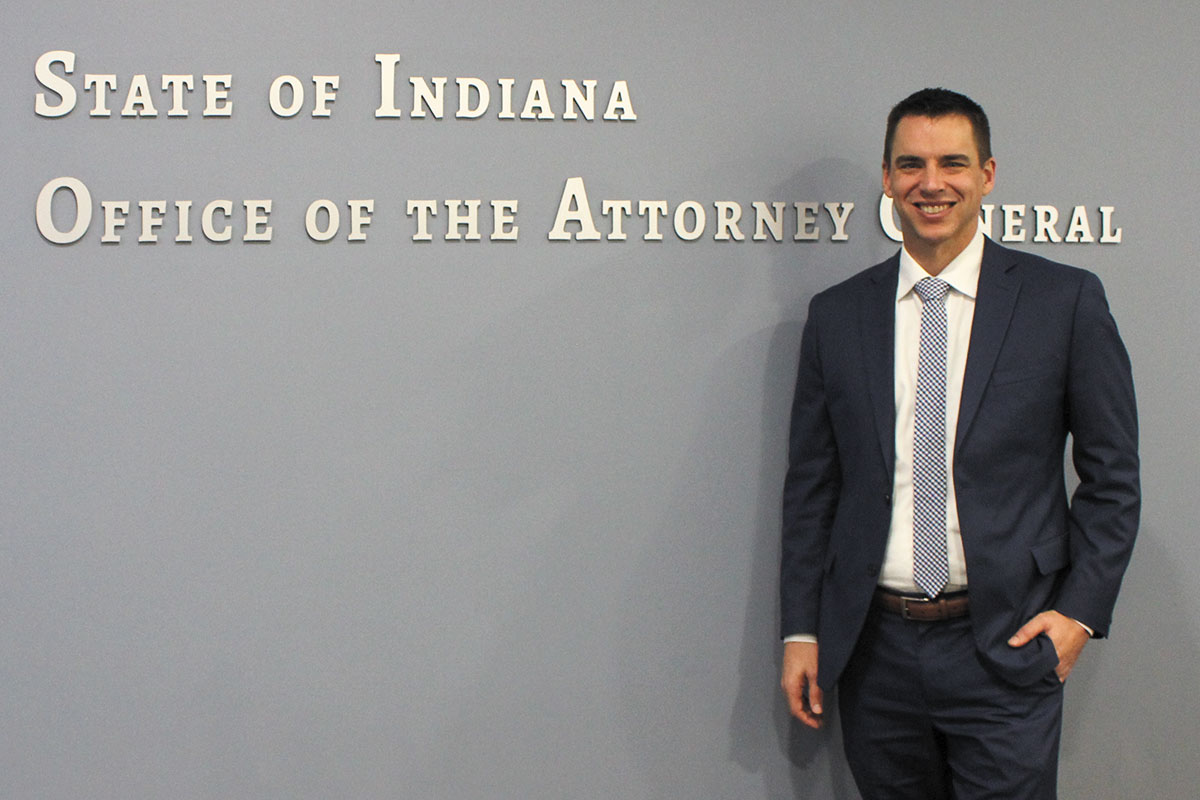Subscriber Benefit
As a subscriber you can listen to articles at work, in the car, or while you work out. Subscribe Now
Thomas M. Fisher said he had no immediate plans to leave the Office of the Attorney General and his position as the state’s first solicitor general when he recruited James Barta to be his deputy.

Still, Fisher said he knew he wanted to hire someone who could succeed him. And as it turns out, that’s what he did.
After 20 years in the role, Fisher announced in August that he was stepping down as solicitor general to work for EdChoice, a nonpartisan group that advocates for school choice.
In November, Barta succeeded Fisher to become the state’s second solicitor general, a role in which he will oversee litigation involving constitutional challenges and other issues of interest to state government.
“I’m just grateful that we had over a year to work together and learn from each other before I moved on to my next chapter,” Fisher said.
Attorney General Todd Rokita went through a national search to find Fisher’s successor, but Fisher said he always knew Barta was the one for the job.
“James is not only brilliant, he is tenacious and excited to represent Hoosiers in this new role before the highest courts of the land,” Rokita said in a statement.
Fisher likewise described Barta as a brilliant and insightful thinker.
“The focus is always on legal interests of the state and making sure that as SG, you’re always thinking broadly about those legal interests and how best to advance them,” Fisher said, “and as long as that remains kind of the focal point, you’ll do just fine.”
Earlier in Barta’s career, he was a law clerk for Fisher.
“I came away from that internship thinking there would be few jobs more exciting than to work in a state solicitor general’s office because you get to be on the public law side dealing with issues that affect the people, you get to be a voice for upholding the rule of law and you get to deal with a wide variety of issues, everything from criminal procedure to Medicaid to environmental issues to constitutional issues,” Barta said.
Coming home
Barta had just made partner at MoloLamken LLP in Washington, D.C., when he took the job as Indiana’s deputy solicitor general in April 2022.
He is a Hoosier native, and he said he was excited to return to his roots after getting his Bachelor of Arts in government/political theory at Patrick Henry College in Virginia, then his J.D. at Georgetown University Law Center in Washington, D.C.
“The prospect of being able to come back to my home state to work in the office just was a really exciting and thrilling idea,” Barta said. “So I snapped it up.”
One of the things he is looking forward to in his new role as Indiana solicitor general, he said, is working more closely with Rokita and other attorneys in the Attorney General’s Office.
“There’s a really exceptional group of attorneys who are really dedicated to serving the state, who are very competent at what they do, and I think one of the things I’m most excited about is just getting to work with them more on the various cases, just because it’s always a delight to work with them,” he said. “And I look forward to getting to know them better and doing good work together for the state.”
He added that the transition so far has been a natural progression given that he was deputy solicitor general and worked closely with Fisher.
Outside of work, Barta likes walking, hiking, running and playing tennis. He’s also gone on backpacking trips in Wyoming and Montana, which he finds restorative.
Career highs
Barta’s legal career has also included being a law clerk for Judge Stephen J. Murphy III of the U.S. District Court for the Eastern District of Michigan and Judge Raymond M. Kethledge of U.S. Court of Appeals for the 6th Circuit, and being an adjunct professor at his alma mater, Georgetown University Law Center.
He described his time teaching as one of his favorite parts of his career so far.
“I think there are a few greater joys than to sit in a classroom, have a discussion with students and see a lightbulb go on as they thought about something that they had never thought of before or finally grasp a concept,” Barta said. “Even if they come away and maybe they hold one view of the reading we did, I hold a different view, that’s OK. But you see them come away with a better understanding of why they’ve reached their own conclusions, and better equipped to be good practicing lawyers. And that, I think, was just one of the most rewarding and meaningful things I’ve been able to do.”
On the litigation side, Barta said his favorite moments were watching oral arguments at the United States Supreme Court, specifically in the cases of Ziglar v. Abassi, Frank v. Gaos and United States v. Arthrex.
“It was just a very wonderful experience, both to be in this historical moment, as well as it helps to restore faith in the judicial system when you see how engaged all parties are in trying to get to the right answer,” Barta said.
Finding inspiration
Asked who inspires him, Barta pointed to conservative stalwart Justice Clarence Thomas. He said he’s read Thomas’ memoir and pointed to the justice moving past a difficult childhood to invest in others.
Once, Thomas invited Barta and his students to meet with him. The class had a 30-minute block with the justice, but the visit ended up lasting more than two hours because Thomas spent time talking to each student individually.
“I thought it was just very inspiring because you had someone who is probably at the height of what a lot of people would consider the legal profession, being a justice on the Supreme Court, and yet the position didn’t mean that he was going to treat anyone any differently,” Barta said. “Whether you’re a lowly law student or a lawyer or arguing in front of him or one of his colleagues, he’s going to invest in you to get to know you and treat you just like you would any other human being.”
One piece of advice that Barta said he tries to keep in mind is to listen well and write clearly.
But the best advice he’s received, he said, is, “If someone is going to jail, make sure it’s your client and not you.”
For Barta, that means that no case is so important that it justifies compromising his integrity or reputation.
“I think a really good way of putting it that has stuck with me is remembering that at the end of the day, you are first and foremost just servant of the law, the court and the ideals of the profession, not just trying to get to it a particular result,” he said.•
Please enable JavaScript to view this content.

